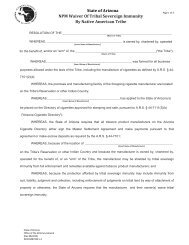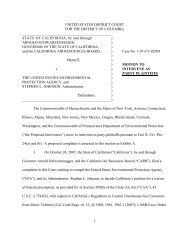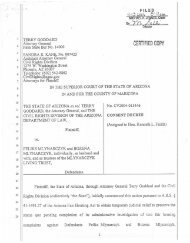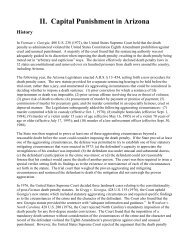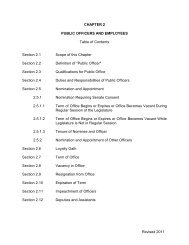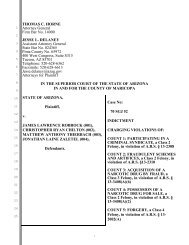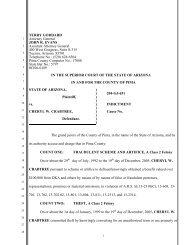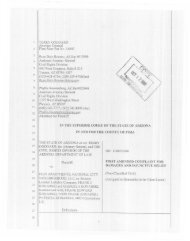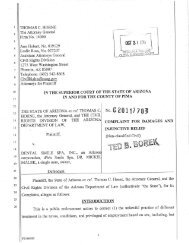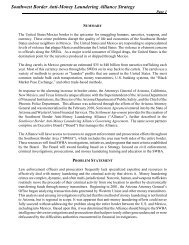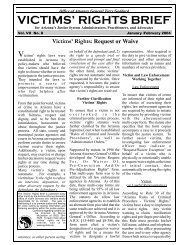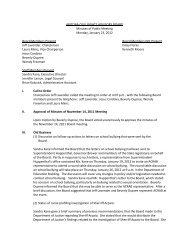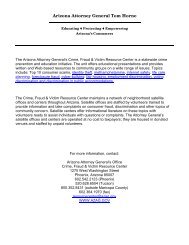Complaint - Arizona Attorney General
Complaint - Arizona Attorney General
Complaint - Arizona Attorney General
Create successful ePaper yourself
Turn your PDF publications into a flip-book with our unique Google optimized e-Paper software.
.J<br />
(.<br />
2<br />
3<br />
4<br />
JAMES WALSH, Acting <strong>Attorney</strong> <strong>General</strong>*<br />
Firm State Bar No. 14000<br />
Sandra R. Kane, No. 007423<br />
Assistant <strong>Attorney</strong> <strong>General</strong><br />
1275 W. Washington<br />
Phoenix, AZ 85007<br />
Telephone: (602) 542-8862<br />
<strong>Attorney</strong>s for Plaintiff<br />
,",;.~<br />
Ġ.<br />
< y,:J1I><br />
f)~~~<br />
~\S\,.\,j ~ t..<br />
!:-'r.,,'(;.$'r:.,~~'4..<br />
{..\.~.s~,,1<br />
.,,~<br />
~~~\\~<br />
;t~;:';. ~~\i\\~~~'V<br />
i7 &i..''\'c> 'OYI'V."I<br />
5 '",,-<br />
6<br />
7<br />
8<br />
IN THE SUPERIOR COURT OF THE STATE OF ARIZONA<br />
IN AND FOR THE COUNTY OF MARICOPA<br />
9 THE STATE OF ARIZONA ex reI. JAMES<br />
WALSH, Acting <strong>Attorney</strong> <strong>General</strong>,* and THE<br />
10 CIVIL RIGHTS DIVISION OF THE ARIZONA<br />
No. CV2004-013335<br />
DEPARTMENT OF LAW,<br />
11<br />
'COMPLAINTFOR DAMAGES<br />
Plaintiff,<br />
12<br />
AND INJUNCTIVE RELIEF<br />
13<br />
vs.<br />
(Other Civil)<br />
14<br />
TOWN OF PAYSON, a municipal corporation of<br />
the State of <strong>Arizona</strong>.<br />
15<br />
16<br />
Defendant.<br />
17
provide appropriate damages and penalties for Defendant's<br />
unlawful housing practices based<br />
2 on disability. 1<br />
3<br />
4<br />
JURISDICTION<br />
AND VENUE<br />
1. This court has jurisdiction of this matter pursuant to A.R.S. § 41-1491.34(A).<br />
5<br />
-<br />
6 2. Venue is proper in Maricopa County pursuant to A.R.S. § 12-401(17).<br />
7<br />
PARTIES<br />
8<br />
9<br />
3. Plaintiff <strong>Arizona</strong> Civil Rights Division of the <strong>Arizona</strong> Department of Law ("the<br />
10 Division") is an administrative agency of the State of <strong>Arizona</strong> established by A.R.S. § 41-1401<br />
11<br />
12<br />
13<br />
to enforce the provisions of the <strong>Arizona</strong> Civil Rights Act ("ACRA") and the <strong>Arizona</strong> Fair<br />
Housing Act ("AFHA").<br />
14 4. Defendant Town of Payson is a municipal corporation of the State of <strong>Arizona</strong>.<br />
15<br />
16<br />
17<br />
5. Plaintiff brings this action on its own behalf and on behalf of Steps House, Inc.<br />
("Steps House"), a nonprofit <strong>Arizona</strong> corporation, who has been discriminated against or is<br />
18 about to be discriminated against by Defendant on the basis of disability in violation of the<br />
19 II AFHA.<br />
20 "..<br />
6.<br />
- ",,21..<br />
Steps House operates group homes for individuals with disabilities in <strong>Arizona</strong>.<br />
22 Steps House is an aggrieved person within the meaning of A.R.S. § 41-1491(1) and (9).<br />
23<br />
24<br />
25<br />
26<br />
27<br />
28<br />
I Initially, the <strong>Arizona</strong> Fair Housing Act referred to "handicap" discrimination. Thereafter, all AFHA references to handicap<br />
were statutorily changed to "disability." See A.R.S. § 41-1491(5) (1991). The terms "disability" and "handicap" are used<br />
interchangeably throughout this complaint.<br />
2<br />
259329<br />
I
2<br />
3<br />
GENERAL ALLEGATIONS<br />
Group Home Zoning<br />
4 7. The Federal Fair Housing Amendments Act, 42 U.S.c. §§ 3601- 3619 (1988)<br />
5<br />
6<br />
7<br />
("FHAA") made it unlawful, among other things, to engage in housing discrimination based on<br />
a person's disability or based upon a person, such as a group home, providing housing to<br />
8 persons with disabilities. Under the FHAA, it is unlawful to make housing unavailable because<br />
9<br />
10<br />
II<br />
of disability, or to refuse to make a reasonable accommodation in rules, policies, practices, or<br />
services, if the accommodation may be necessary to afford a disabled person with equal<br />
12 opportunity to use and enjoy a dwelling.<br />
13<br />
14<br />
15<br />
8. The AFHA, adopted in 1991, is substantially equivalent to the FHAA, including<br />
the disability provisions.<br />
16 9. Under A.R.S. § 41-1491(5) of the AFHA, "disability" means a mental or physical<br />
17<br />
18<br />
19<br />
impairment that substantially limits at least one major life activity, a record of such an<br />
impairment, or being regarded as having such an impairment.<br />
Disability does not include<br />
20 current illegal use of or addiction to any drug or illegal or federally controlled substance.<br />
21<br />
22<br />
23<br />
10. Recovering alcoholics and recovering drug addicts are persons with disabilities<br />
within the meaning of the FHAA and the AFHA..<br />
24 11. Prior to 1996, Defendant did not allow group homes for persons with disabilities<br />
25<br />
26<br />
as permitted uses in any of its zoning districts.<br />
27<br />
28<br />
259329<br />
3<br />
I<br />
!
.1<br />
12. On or about February 2, 1996, Defendant adopted its "Basis for Group Homes<br />
2 Policy" ("Group Homes Policy") in response to the FHAA and the AFHA.<br />
3<br />
13. Under Points 6 and 7 of the Group Homes Policy, Defendant chose to classify<br />
4<br />
5 group homes as permitted uses in all residential zones, but placed limits on the maximum<br />
6 number of persons who could occupy a group home to 6 residents and 2 operators.<br />
7<br />
14. Under Point 7 of the Group Homes Policy, Defendant categorized homes for<br />
8<br />
9 alcoholics and ex-drug users as "halfway homes" rather than group homes to avoid what<br />
10 Defendant stated to be "undue adverse impacts to neighborhoods."<br />
II<br />
15. On or about February 1996, Defendant amended its Unified Development Code<br />
12<br />
13 ("Zoning Code") in accordance with its Group Homes Policy. Defendant's Zoning Code<br />
14 permits group homes in all residential zones and requires group homes to be licensed by the<br />
IS<br />
16<br />
17<br />
<strong>Arizona</strong> Department<br />
of Health Services under Title 36, <strong>Arizona</strong> Revised Statutes, and subjects<br />
group homes to the occupancy restrictions contained in the Group Homes Policy.<br />
18 16. In the Zoning Code, as in the Group Homes Policy, Defendant treats homes for<br />
19<br />
20<br />
21<br />
recovering alcoholics and ex-drug users as "halfway homes," rather than group homes.<br />
17. Defendant's Zoning Code restricts "halfway homes" from all R-l single-family<br />
22 residential and R-2 residential zones in Payson. Defendant's Zoning Code relegates "halfway<br />
23 II homes" to commercial<br />
24 "<br />
. conditional use permit.<br />
zones, or to R-3 multi-family housing zones if Defendant grants a<br />
25<br />
26<br />
27<br />
28<br />
11259329<br />
4
[I<br />
Bassett Lane Group Homes<br />
2 18. On or about June 1996, Defendant approved R-l single-family residential zoning<br />
3<br />
4<br />
5<br />
for the Four Seasons Adult Care Home at 307 S. Bassett Lane in Payson, without requiring that<br />
group home to have a Title 36 license.<br />
The Four Seasons Adult Care Home did not serve<br />
6 recovering alcoholics or recovering drug addicts.<br />
7<br />
8<br />
9<br />
19. On or about September 2000, Defendant investigated a neighbor's complaint<br />
about activities at 307 S. Bassett Lane.<br />
Defendant was informed by the property manager that<br />
10 the property was being used as a "sober house" for five or six recovering alcoholics, and was no<br />
11<br />
12<br />
13<br />
longer being used by the Four Seasons Adult Care Home.<br />
After consulting with Defendant<br />
regarding applicable zoning requirements, the property manager advised Defendant that it<br />
14 decided to close the home and notify the residents to move out because it could not get state<br />
15<br />
16<br />
17<br />
licensing.<br />
20. On or about November 2000, Steps House rented the property located at 307 S.<br />
18 Bassett Lane and began operating its group home ("the Group Home") for recovering alcoholics<br />
19<br />
20<br />
21<br />
and recovering drug addicts in an R-l single-family residential zone ("R-l zone") in Payson.<br />
Steps House<br />
22 21. Steps House provides its residents with housing and referrals to behavioral health<br />
23<br />
24<br />
25<br />
services, and requires that its residents attend 12-step program meetings off-site, work, do<br />
chores, remain clean and sober, and follow rules.<br />
Steps House does not provide direct patient<br />
26 evaluation, diagnosis, case management, care or treatment. Steps House is not required to be<br />
27<br />
28<br />
259329<br />
5
licensed under the <strong>Arizona</strong> Department of Health Services by Title 36, <strong>Arizona</strong> Revised<br />
2 Statutes.<br />
3<br />
22. On or about Noyember 30, 2000, Defendant informed Steps House that a group<br />
4<br />
5 home needed a Title 36 license to operate in an R-l zone. At that time, Defendant also<br />
6 informed Steps House that it could not operate in an R-l zone because Defendant considered<br />
7<br />
8<br />
9<br />
Steps House's Group Hometo be a "halfway house," which use was not permitted use in an R-l<br />
zone.<br />
10 23. On or about December 4, 2000, Steps House was the only group home for<br />
11<br />
12<br />
13<br />
recovering alcoholics or recovering drug addicts located in the Town of Payson. At that time,<br />
Steps House wrote to Defendant<br />
to clarify that it was operating a group recovery home for<br />
14 alcoholics and drug addicts. In that letter, Steps House provided legal authority, under the<br />
15<br />
16<br />
17<br />
FHAA and other federal laws, for requiring local governments to make reasonable<br />
accommodations<br />
in zoning laws to allow group homes for recovering alcoholics and recovering<br />
18 drug addicts in residential zones. Steps House also offered to apply for a special use permit. In<br />
19<br />
20<br />
21<br />
its letter, Steps House further advised Defendant that it was exempt from Title 36 licensure and<br />
provided legal authority for the exemption.<br />
22 24. On or about January 23, 2001, Defendant sent a letter in response to Steps<br />
23<br />
24<br />
25<br />
House's December 4, 2000 letter and ordered Steps House to immediately cease and desist<br />
operating a "halfway home" at 307 S. Bassett Lane. Inits January 23, 2001 letter, Defendant<br />
26 informed Steps House that a group recovery home for alcoholics and addicts was considered a<br />
27<br />
28<br />
259329<br />
6
, ..I<br />
"halfway home" under Defendant's Zoning Code and, for that reason, could not operate in an<br />
2 R-1 zone. Defendant further advised that Steps House was not eligible for a special or<br />
3<br />
4<br />
5<br />
conditional use permit to operate in an R-1 zone because halfway homes are not permitted uses<br />
in R-1 zones.<br />
6 25. On or about February 13, 2001, Steps House filed a timely administrative housing<br />
7<br />
8<br />
9<br />
discrimination<br />
complaint with the Division against Defendant.<br />
26. The Division investigated Steps House's administrative housing discrimination<br />
10 complaint pursuant to A.R.S. § 41-1491.22. Defendant decided not to proceed with enforcing<br />
11<br />
12<br />
13<br />
its Zoning Code against Steps House pending resolution of Steps House's administrative fair<br />
housing complaint.<br />
14 27. On or about February 25,2003, the Division issued a finding, pursuant to A.R.S.<br />
15<br />
§ 41-1491.29 of the AFHA, that there was reasonable cause to believe that discrimination had<br />
16<br />
occurred or was about to occur.<br />
17<br />
18 28. On or about March 13,2003, the Division and the Defendant entered into an<br />
19<br />
20<br />
21<br />
Agreement ("the Tolling Agreement") to toll the time for filing suit under the AFHA pending<br />
settlement negotiations.<br />
Pursuant to the Tolling Agreement, on or about June 11, 2004, the<br />
22 Division served written notice upon the Defendant that conciliation efforts were no longer<br />
23<br />
24<br />
25<br />
meaningful and that the tolling period would end thirty days after service of the notice.<br />
29. Upon information and belief, Defendant has not recognized as permitted uses or<br />
26 approved zoning for any "halfway homes" or group homes for recovering alcoholics or<br />
27<br />
28<br />
259329<br />
7
ecovering drug addicts in residential zones in the Town of Payson.<br />
2 COUNT ONE<br />
3<br />
(Violation of the AFHA by Making Housing Unavailable to Persons with Disabilities)<br />
4 30. Plaintiff realleges and incorporates by reference the allegations contained in<br />
5<br />
6<br />
7<br />
paragraphs<br />
1 through 29 of this <strong>Complaint</strong>.<br />
31. It is a violation of A.R.S. § 41-1491.19(A) of the AFHA for a person to<br />
8 discriminate in the sale or rental or otherwise make unavailable or deny a dwelling to any buyer<br />
9<br />
10<br />
11<br />
or renter because of a disability of: (1) that buyer or renter; (2) a person residing in or intending<br />
to reside in that dwellingaft-er<br />
it is sold, rented or made available; or (3) a person associated<br />
12 with that buyer or renter.<br />
13<br />
32. Defendant adopted its Group Home Policy and Zoning Code with the intention to<br />
14<br />
15<br />
make housing unavailable to recovering alcoholics and recovering drug addicts living in group<br />
16 homes in residential zones of Payson, in violation of the AFHA. Defendant issued its January<br />
17<br />
18<br />
19<br />
23, 2001 cease and desist order to Steps House, pursuant to the Group Home Policy and the<br />
Zoning Code, to make housing in an R-I zone unavailable to Steps House based on the<br />
20 disabilities of persons residing at or intending to reside at Steps House's Group Home, in<br />
21<br />
22<br />
23<br />
violation of the AFHA.<br />
33. Despite having previously approved zoning for another group home to operate at<br />
24 the same location without a Title 36 license, Defendant informed Steps House that it could not<br />
25<br />
26<br />
operate the Group Home at that location without a Title 36 license. By imposing the Title 36<br />
27<br />
28<br />
259329<br />
8
license requirement<br />
upon Steps House, Defendant made housing in an R-1 zone unavailable to<br />
Steps House based upon the disability of the persons residing at or intending to reside at Steps<br />
House's Group Home, in violation of the AFHA.<br />
34. By imposing its Title 36 Zoning Code requirement upon Steps House, who is<br />
exempt from that requirement, Defendant made housing unavailable based upon the disability<br />
of persons residing at or intending to reside at Steps House's Group Home in an R-1 singlefamily<br />
residential zone of Payson, in violation of the AFHA.<br />
35. Steps House has been harmed as a result of Defendant's discriminatory conduct.<br />
COUNT TWO<br />
(Violationof the AFHAby Making Discriminatory Statements)<br />
36. Plaintiff realleges and incorporates by reference the allegations in paragraphs 1<br />
through 35 of this <strong>Complaint</strong>.<br />
37. It is a violation of A.R.S. § 41-1491.15 of the AFHA for a person to make, print,<br />
publish or cause to be made, printed or published<br />
any notice or statement with respect to the<br />
sale or rental of housing that indicates any preference, limitation or discrimination based on<br />
disability or an intention to make such a preference, limitation or discrimination.<br />
38. In its Group Home Policy, Zoning Code, November 30, 2000 verbal statement to<br />
Steps House, and January 23, 2001 written cease and desist order based on the Group Home<br />
Policy and Zoning Code, Defendant made, printed and/or published statements with respect to<br />
group housing for recovering alcoholics and recovering addicts which indicated a preference,<br />
9<br />
259329
limitation or discrimination based on disability or an intention to make such a preference,<br />
2 limitation or discrimination, in violation of the AFHA.<br />
3<br />
4<br />
5<br />
39. Defendant's Group Home Policy and Zoning Code are facially discriminatory<br />
against disabled recovering alcoholics and recovering drug addicts by classifying their group<br />
6 homes as "halfway homes" and making group housing for them unavailable as a permitted use<br />
7<br />
8<br />
9<br />
10<br />
11<br />
in any residential zones of Payson, in violation of the AFHA.<br />
COUNT THREE<br />
(Violation of the AFHA by Refusal to Make Reasonable Accommodation)<br />
40. Plaintiff realleges and incorporates by reference the allegations contained in<br />
12 paragraphs 1 through 39 of this <strong>Complaint</strong>.<br />
I3<br />
14<br />
15<br />
41. Under A.R.S. § 41-1491.19(E)(2) of the AFHA, it is discriminatory to refuse to<br />
make a reasonable accommodation in rules, policies, practices or services if the accommodation<br />
16 may be necessary to afford a person with disabilities an equal opportunity to use and enjoy a<br />
17<br />
18<br />
19<br />
dwelling.<br />
42. In its December 4, 2000 letter to Defendant, Steps House requested<br />
20 accommodations in Defendant's Zoning Code's Title 36 licensing and halfway home<br />
21<br />
22<br />
23<br />
classification provisions. The requested accommodations were reasonable and necessary to<br />
enable Steps House to provide equal housing opportunity for disabled present and future<br />
24 recovering alcoholic and recovering drug addict residents of the Group Home to live in a group<br />
25<br />
26<br />
home in an R-l zone of Payson. By refusing to grant reasonable accommodations to Steps<br />
27<br />
28<br />
259329<br />
10
I<br />
House, Defendant discriminated against Steps House based on the disabilities of persons<br />
2 residing at or intending to reside at Steps House's Group Home, in violation of A.R.S. § 41-<br />
3<br />
4<br />
5<br />
6<br />
l49l.l9(E)(2)<br />
of the AFHA.<br />
COUNT FOUR<br />
(Violation of the <strong>Arizona</strong> Fair Housing Act by Pattern or Practice of Discrimination)<br />
7 43. Plaintiff realleges and incorporates by reference the allegations contained in<br />
8<br />
9<br />
paragraphs 1 through 42 of this <strong>Complaint</strong>.<br />
10 44. Defendant has engaged in a pattern or practice of resistance to the full enjoyment<br />
II<br />
of rights granted under the AFHA by adopting and enforcing its Group Home Policy and<br />
12<br />
Zoning<br />
13<br />
Code against group homes for recovering alcoholics and recovering drug addicts<br />
14 desiring to locate in residential zones.<br />
15<br />
16<br />
17<br />
45.<br />
Through its cease and desist order, Defendant denied Steps House rights granted<br />
under the AFHA. Defendant's denial of rights to Steps House raises an issue of general public<br />
18 importance.<br />
19 46. Defendant is subject to a statutory civil penalty under A.R.S. § 4l-l491.35(B)(3)<br />
20<br />
21<br />
22<br />
of the AFHA in an amount up to $50,000 for a first violation and $100,000 for any subsequent<br />
violation.<br />
23<br />
WHEREFORE, Plaintiff requests the following relief:<br />
24<br />
A. Enter judgment for the Division against Defendant for housing discrimination in<br />
25<br />
26 violation of the AFHA;<br />
27<br />
28<br />
259329<br />
11
B. Award actual damages in an amount to be determined at trial to compensate<br />
2 Steps House for Defendant's unlawful conduct;<br />
3<br />
4<br />
5<br />
c. Impose a statutory civil penalty against Defendant under A.R.S. § 41-<br />
1491.35(B)(3) in an amount up to $50,000 for a first violation and $100,000 for any<br />
6 subsequent violation to vindicate the public interest due to Defendant's pattern or practice of<br />
7<br />
resistance to full enjoyment of and denial of rights granted to persons with disabilities by the<br />
8 II<br />
AFHA;<br />
I: II D.<br />
Grant a permanent injunction enjoining Defendant, its employees and agents and<br />
II II<br />
a11<br />
II<br />
12<br />
persons in concert and participation with them from engaging in any housing-related<br />
practice which discriminates on the basis of disability or interferes with the exercise of rights<br />
13<br />
14 granted by the AFHA, including, but not limited to: (1) enforcing its Zoning Code against<br />
15<br />
16<br />
17<br />
Steps House and other group homes for recovering alcoholics and recovering drug addicts to<br />
make housing unavailable to them in residential zones of Payson; (2) requiring Title 36<br />
18 licenses from group homes for persons with disabilities where the group homes are exempt<br />
19<br />
20<br />
21<br />
from such licensing; (3) enforcing occupancy and other Zoning Code restrictions against group<br />
homes for persons with disabilities without making reasonable accommodations,<br />
as required by<br />
22 the AFHA; and (4) retaliating against Steps House for filing a fair housing complaint against<br />
23<br />
24<br />
25<br />
Defendant.<br />
E. Declare null and void those portions of Defendant's Zoning Code which: (1)<br />
26 require Title 36 licenses from group homes for persons with disabilities when the group homes<br />
27<br />
28<br />
259329<br />
12
do not provide services for which Title 36 licenses are required; and (2) exclude group homes<br />
2 for recovering alcoholics and recovering drug addicts from operating in residential zones.<br />
3<br />
4<br />
5<br />
F. Order Defendant to institute and carry out fair housing policies and zoning<br />
enforcement procedures to provide equal housing opportunities for persons with disabilities,<br />
6 including providing reasonable accommodations for persons with disabilities, as required by<br />
7<br />
8<br />
9<br />
the AFHA;<br />
G. Order the Division to monitor Defendant's compliance with the AFHA, and<br />
10 order Defendant to pay the Division a reasonable amount for such monitoring;<br />
11<br />
H. Award the Division its reasonable attorneys fees and costs of bringing this<br />
12<br />
13<br />
action; and<br />
14 I. Award such other and further relief as the Court deems just and proper in the<br />
15<br />
16<br />
17<br />
public interest.<br />
V--<br />
DATED this~ day of July, 2004.<br />
18 . JAMES WALSH, Acting <strong>Attorney</strong> <strong>General</strong>*<br />
19<br />
20 By<br />
/,<br />
Sandra R. Kane<br />
21<br />
22<br />
23<br />
Assistant <strong>Attorney</strong> <strong>General</strong><br />
Civil Rights Division<br />
<strong>Attorney</strong>s for Plaintiff<br />
24<br />
25<br />
26<br />
27<br />
28<br />
259329<br />
13



